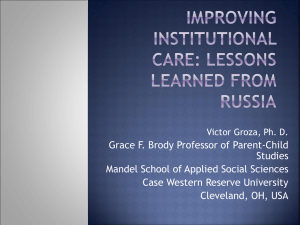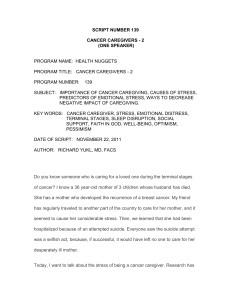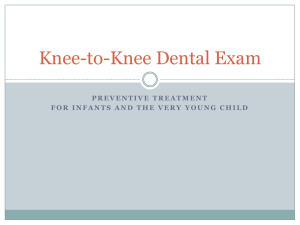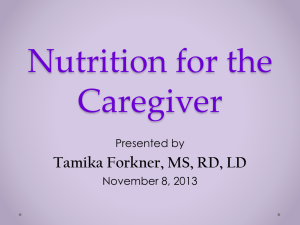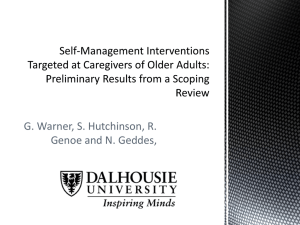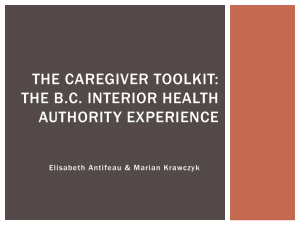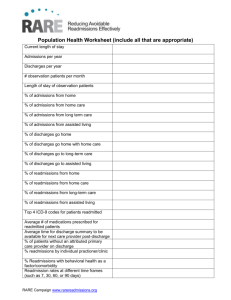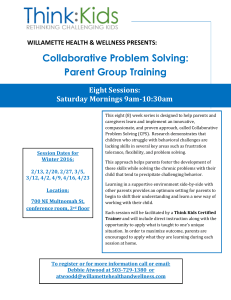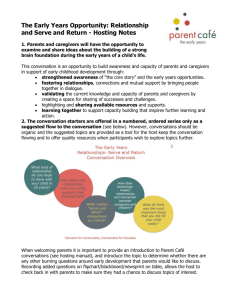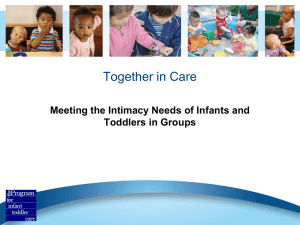Family Caregiving - Tennessee Center for Patient Safety
advertisement
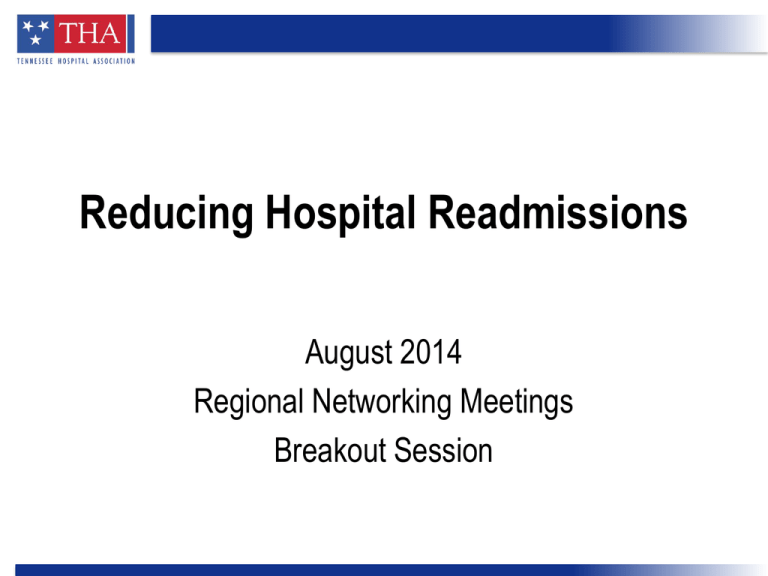
Reducing Hospital Readmissions August 2014 Regional Networking Meetings Breakout Session Readmissions & Family Caregivers Rhonda Clark, MSN, RN ~ QI Specialist rclark@tha.com Caring for Those We Love Total Admissions and Readmissions by Patient Point of Origin, HY2 2013 Total Readmissions % of Readmissions Total Admissions % of Admissions Clinic/Phys Office 4,683 12.58% 47,055 13.42% Non-healthcare facility (i.e. home) 28,391 76.28% 236,904 67.54% Transfer from ambulatory surgery center 11 0.03% 49 0.01% Transfer from another healthcare facility 247 0.66% 2,114 0.60% Transfer from different hospital 2,696 7.24% 22,508 6.42% Transfer from SNF, ICF or ALF 475 1.28% 2,932 0.84% Transfer to another unit in same hospital 196 0.53% 1,567 0.45% Patient Point of Origin Discharge Status From Index Admission HY2 2013 Discharge Status # Index Admissions % of Total Admissions To home or self care 22,069 59.29% To home for home health/skilled care 6,475 17.40% To skilled nursing facility – Mcare 5,293 14.22% To short-term general hospital for inpatient care 847 2.28% To inpatient rehab facility, including hospital rehab units 759 2.04% Left against medical advice/discontinued care 511 1.37% To psych hospital or psych unit of a hospital 259 0.70% To ICF that provides custodial or supportive care 255 0.69% To hospice-home 174 0.47% To Mcare approved swing bed within this institution 145 0.39% T Mcare certified LTCH 144 0.39% To nursing facility certified under Mcaid but not Mcare 40 0.11% To home or self care with planned acute care hospital IP readmit 22 0.06% Family Caregiving Family Members Family + Paid Care Paid Care Only 7% 17% 76% “Family caregivers have become unpaid and untrained lay nurses, routinely providing complex care such as medication management, infusions, injections, wound care, and monitoring of medical equipment.” -- Carol Levine • Women (traditional caregivers) have entered the workforce in record numbers since the 1960s • Families are smaller • Patients have increasingly complicated care – Increased chronic illnesses – Shorter hospital stays – Hospice and palliative care underutilized – Increased technology associated with treatment • Increased costs for medical care • Long waiting lists for home and communitybased services • Stringent income and asset eligibility criteria for long term care Impact on Family Caregivers • Higher risk for: – Clinical depression – Stress-related illnesses such as high blood pressure, immune system deficiencies, cardiac problems, headaches, fatigue – Poor self care – Financial strain – Problems at work In A Nutshell… • Most readmissions come from home • Most home care is provided by family members • Family caregivers carry a heavy load for which they may not be adequately prepared or with which they cannot effectively cope • Family caregiving will continue to increase as population grows and ages What can we do to help prepare and support family caregivers? Caregiver Advise Report Enable (CARE) Act • Three elements documented in record: – Name of family caregiver (upon admission) – Family caregiver notification of patient discharge or transfer – Explanation and live instruction on the medical tasks family caregivers will provide at home • Such as wound care, transfers, injections, medication management New Project RED Component: Tool 7 • Family engagement in discharge planning • http://www.bu.edu/fammed/projectred/Proj ect%20RED%20Revised%20Toolkit%2092012/REDTool7FamilyCaregiversUnitedHo spital%20Fund.pdf Ways We Can Help • Assess needs • Provide training or connect with resources to meet needs – Follow up • Partner with organizations in community for: – Family caregiver training courses – Family caregiver support groups – Respite services Caregiver Action Network Family Caregiver Alliance National Council on Aging AARP Carol Levine • Director of United Hospital Fund’s Families and Health Care Project • Editor of Always on Call: When Illness Turns Families Into Caregivers • Prolific author on family caregiving • Blog for AARP: – http://www.aarp.org/home-family/home-familyexperts/carol-levine/ • Blog for Health Affairs: – http://healthaffairs.org/blog/author/levine/ • Blog for United Hospital Fund: – http://www.uhfnyc.org/news/initiatives/familycaregiving?c=char_1&d=uu&e=1 Next Step in Care
